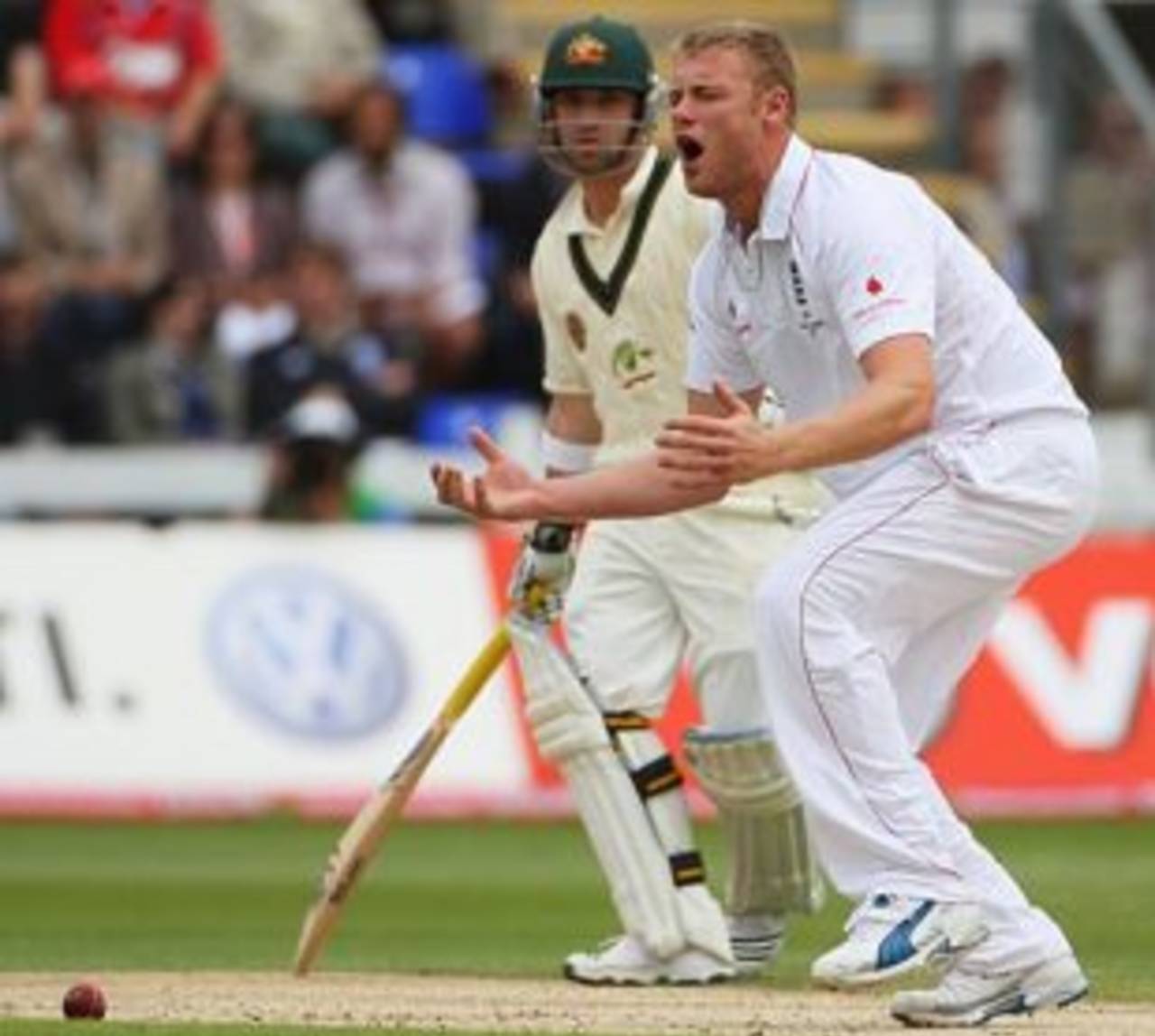Surgeon warns of player workload
More fast bowling all-rounders will follow Andrew Flintoff into premature Test retirement unless the game's administrators take drastic action to reduce their heavy workloads, according to a leading knee surgeon
Alex Brown at Lord's
15-Jul-2009

Cracking under the workload: more players face cutting short their careers like Andrew Flintoff • Getty Images
More fast bowling all-rounders will follow Andrew Flintoff into premature Test retirement unless the game's administrators take drastic action to reduce their heavy workloads, according to a leading knee surgeon. Dr Derek Bickerstaff - who has operated on the likes of Michael Vaughan, Darren Gough, Simon Jones and Paul Collingwood - warned that, should the status quo remain, Flintoff would not be the last victim of a punishing schedule and a system that encourages players to push through the pain barrier in search of financial incentives.
"Generally, there is too much cricket being played and too much of it on hard grounds," Bickerstaff told Cricinfo. "The pressure being placed upon fast bowlers and particularly all-rounders is too great. The way cricket is organised at present, it is inevitable that players such as Andrew Flintoff will be faced with shorter careers.
"Flintoff is a player of tremendous energy and intensity; one of those cricketers who always gives 110 percent. Darren Gough was quite similar in that regard, and after a while he was unable to withstand the rigours of a five-day game. Quite simply, there is too much cricket being played, and it is having a big impact on players."
A glance at the attrition rates among the world's leading fast bowling all-rounders suggests Bickerstaff's warning is worth heeding. Since the beginning of 2007 Flintoff, Jacob Oram, Dwayne Bravo and Shane Watson have missed a combined 62 percent (59 out of 95) of Test matches played by their respective countries due almost exclusively to injury. They have also missed 42 percent (108 out of 255) of one-day internationals and an almost identical percentage of Twenty20s (31 out of 73). Jacques Kallis, of South Africa, is the anomaly of the fast bowling all-rounders, having missed only a handful of limited overs games over the time span.
Oram, a team-mate of Flintoff at the Chennai Super Kings, conceded during the IPL that his workload as an all-rounder in three forms of the game was "unsustainable" and that he would consider retiring from New Zealand's Test side in the next 12 months. "I would love to keep going as an allrounder in all forms of the game, but I realise that's a bit of a double-edged sword," Oram told Cricinfo. "If I was to do so, I would pretty much halve the time I have left in the game. And, from recent experience, I can say that sitting on the sidelines for several months a year watching your team-mates play is mentally and emotionally draining."
Medical experts have previously advised the ECB that current schedules were placing too heavy a burden on fast bowlers and all-rounders, and that urgent change was required. Bickerstaff believes that change should take the form of a football-style rotational policy, given the unlikelihood of boards reducing the frequency of matches.
"If you look at a team like Manchester United or Arsenal, they have a squad of something like 20 players," he said. "That isn't so much for form issues, but for rotation, because with the volume of matches being played, players need a rest from time to time.
"The problem with cricket at the minute is that the scheduling is constant, players are paid well and there is great incentive for them to push harder, with bonuses and match payments at stake. The problem with that is that someone like Flintoff, who plays with such intensity, will almost inevitably come a cropper at some stage.
"I think the concept of rotation has merit. There will be resistance because there is so much financial incentive for boards to be scheduling more and more cricket, and for players to be on the field all the time. The problem is that once you overload a knee or an ankle repeatedly, there will inevitably be problems and you can't turn back the clock."
Flintoff declined to discuss in depth the role workload played in his horrific run of injuries, but Ricky Ponting, the Australian captain, conceded international cricket's crowded schedule was taking its toll on players.
"There's no doubt we are playing a lot at the moment," Ponting said. "Even though these guys are superstar players, maybe when you're in the middle of their glory years you have to make sure you manage them as well as you can. You look at the big picture of trying to get an extra couple of years out of their career, rather than grinding them into the ground too soon."
| Tests | ODIs | T20s | ||
|---|---|---|---|---|
| Jacob Oram | 9 | 43 | 17 | |
| New Zealand | 19 | 63 | 21 | |
| Missed | 10 | 20 | 4 | |
| Dwayne Bravo | 12 | 43 | 14 | |
| West Indies | 22 | 58 | 16 | |
| Missed | 10 | 15 | 2 | |
| Shane Watson | 5 | 25 | 5 | |
| Australia | 23 | 22 | 19 | |
| Missed | 18 | 47 | 14 | |
| Andrew Flintoff | 10 | 36 | 6 | |
| England | 31 | 62 | 17 | |
| Missed | 21 | 26 | 11 | |
| Jacques Kallis | 28 | 49 | 7 | |
| South Africa | 28 | 57 | 20 | |
| Missed | 0 | 8 | 13 |
Alex Brown is deputy editor of Cricinfo